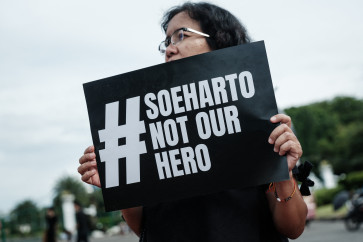Popular Reads
Top Results
Can't find what you're looking for?
View all search resultsPopular Reads
Top Results
Can't find what you're looking for?
View all search resultsSaving forests the customary way
Growing together: Farmers work at their farm in Marena village, Sigi regency, Central Sulawesi
Change text size
Gift Premium Articles
to Anyone
G
rowing together: Farmers work at their farm in Marena village, Sigi regency, Central Sulawesi. The indigenous people are proving that the customary farming system poses no threat to the government’s forest conservation efforts. (Courtesy of JARING/Debora Blandina Sinambela)
Indigenous people have long been scapegoated for deforestation. But Central Sulawesi natives have proven that traditional wisdom and management practices can be used effectively to preserve customary forests, reports The Jakarta Post journalist Safrin La Batu, who took part in an investigative project in collaboration with CNN Indonesia, online media outlet Mongabay.co.id and the Indonesia Network for Investigative Journalism (JARING).
For many years, a forest in eastern Marena in the hinterland of Central Sulawesi has been left unexploited. Today, shrubs and trees grow wildly and unbridled. Among the forest’s most precious products is rattan, which is highly sought after by furniture manufacturers. Trees stand large and tall.
This forest is protected under the customary law of the Marena Kulawi indigenous community. Their customary proscription called ombo is strictly upheld to maintain Mother Nature’s balance.
Ombo prescribes what plants can be harvested, when and what for. Customary leaders decide when members of the community can harvest rattan and herbs. The forests’ products may be reaped primarily for domestic consumption. Harvesting the forest for commercial purposes is prohibited without a permit from the customary council, which charges fees for the communal coffers. Any violations result in hefty fines.
The Marena Kulawi community, a subgroup of the Kulawi tribe in Kulawi district, has also developed a sustainable farming model through the rotation of land use.
To better protect the environment, they divide land based on its function. They have Wanangkiki, a highly-protected forest none can enter; Wana, protected forests where farming is prohibited and Pangale, areas designated for farming.
These rules are meant to be strictly enforced. The community has law enforcers called “protectors of the village”, who regularly patrol the forest. Gaspar Lancia, 54, the community chief, loves to recall the day when his men chased away a group of people who were trying to steal timber.
“They left their loot behind, fearing they would be captured and fined heftily,” he said in Marena, Sigi regency. Gaspar has endless stories about the benefits of living in harmony with nature.
“We don’t see any landslides here, while it often happens elsewhere” he says. “Forests are our elixir of life and so we have to protect them.”

Customary practices are good not just for the environment but also for the villagers, who have more space for farming. Locals, who mostly work for subsistence, say they never worry about what to eat tomorrow because they have enough land to grow food crops.
Robby, 48, and his family of four, survive on two plots of land. On one plot, they grow cash crops, such as cocoa and coffee, and on the other they plant food crops for the family’s daily needs, like corn, tomato and chili.
“Whenever we need tomatoes or chilies, we take them from our farm, no need to buy them,” says Margaret, 45, Robby’s wife.
The villagers began implementing their customary land management practices only a few years ago when they regained access to their communal forests after putting up a fight against the government. For decades, the local government had barred them from entering the forest on the pretext that the land was state property. Officials used to blame them for forest degradation, an accusation they flatly refuted and worked hard to disprove.
For decades, forests around Marena had been regarded as a reserve no human could enter. A part of the forest falls within the famous Lore Lindu Biosphere Reserve and National Park. Trespassers would face legal action and those found guilty of stealing state property could end up in jail. The government argued that the measures were needed to protect the forest as the Agrarian Law mandates.
In Central Sulawesi, where indigenous people depend on forests for their survival, these measures led to hardship — including food scarcity because of reduced land ownership.
Kulawi residents were left with tiny plots of land, each measuring at less than 1 hectare, to grow food and cash crops on. They were pushed to the edge, living on small parcels of land by the river.
Rince Lancia Buha, 62, a Marena community leader, remembers how hard life used to be during the rainy season. At night, villagers could hardly sleep because of the threat of floods that could sweep away their flimsy houses at any time.
Unyielding
Conflict over land ownership with the government became inevitable as the population grew and land scarcity became too much to bear. In the late 1990s and early 2000s, villagers demanded that the state return the 1,800 ha of land around Marena. Most of the disputed property lied within the forest reserve.
The uncompromising resistance paid off. In 2007, the Lore Lindu management loosened its rules and accommodated the peoples’ demands. Both agreed to manage the reserve together and allow residents to harvest rattan.
In October last year, President Joko “Jokowi” Widodo’s administration recognized 1,160 ha of land as the customary property of the Kulawi indigenous community in Marena. Over 750 ha is inside the Lore Lindu National Park.
The customary land is managed communally and individuals are prohibited from opening farms inside Lore Lindu. However, any forest produce can be used by any member of the community so long as they follow the principles of sustainability.
This concession is part of Jokowi’s land reform policy to redistribute 12.7 million ha of state land across the country to local people. It aims at addressing the acute problem of unequal land ownership, including that among indigenous communities.
Along with the Marena Kulawi, eight other indigenous communities also received customary land totaling 3,341 ha. The land distribution policy aims at improving native people’s livelihood and settling conflict over ownership.
Land conflict happens all over Indonesia, involving not just indigenous communities and the government but also local communities and major corporations. The underlying cause is often unequal land distribution.
At the root of the predicament is that about half of Indonesian forests are controlled by corporations. According to Environment and Forestry Minister Siti Nurbaya Bakar, corporations and powerful individuals control 42 million ha of Indonesia’s 125 million ha of forests. Specifically, she says corporations get the lion’s share of 95 percent of these 42 million ha under a variety of permits.
In its most recent report, the Agrarian Reform Consortium recorded 659 agrarian conflicts nationwide in 2017. Most of the conflicts, numbering 208, were connected with plantation projects, followed by property development with 199 cases and infrastructure development with 94 cases.
The government’s distrust in indigenous communities’ ability to sustainably manage forests has further complicated the issue, as in the case of the Marena Kulawi in Central Sulawesi. The slash-and-burn land clearing technique that traditional farmers widely practice remains a major concern.
But the Indigenous People’s Alliance of the Archipelago insists that the issue is no longer relevant. For many years, the organization has worked to raise the native people’s awareness about conservation. Besides, each indigenous community has its own local wisdom about the environment. The Kulawi, for example, have traditionally practiced a land rotation system.
Until citizens regained their customary rights, Sigi’s status as a “conservation regency” led to diminishing land ownership. Forests make up about 75 percent of its land area of 520,000 ha, including the Biosphere Reserve and National Park Lore Lindu.
The prohibition for indigenous people from accessing their customary forests dealt a heavy blow to the regency’s 232,000 residents. Many struggled to meet their basic needs because of their overly small landholdings.
“We have always rejected the ‘conservation regency’ tag,” Sigi Regent Muhamad Irwan Lapata says.
Challenges
For the natives, having regained their customary rights means that they have to hone their farming and conservation skills to prosper as President Jokowi emphasized when launching his land reform scheme.
Even the local customary council has no clear-cut plan on how to make the best of the newfound freedom. People take from the forest but they have no modern marketing and technological know-how. So they sell rattan as raw material at low prices — Rp 1,200 (8 US cents) per kilogram. Herbs are abundant too but the plants remain largely untapped.
Neither is there any financial or technical assistance from the local government for farmers to allow them to improve their forest-based economy. Central Sulawesi Forestry Agency head Nurhadi cites the absence of a legal basis.
The only official who pays attention to locals’ wellbeing is Sigi Regent Muhammad Irwan. He has designed a welfare scheme he calls the “people’s corporate” — a communal business entity that pools people’s processed commodities and sells them to the market at higher prices.
“We will allocate Rp 500 million to Rp 1 billion [for startup capital],” Irwan said.
Lack of transparency in the part of the customary council is another issue that locals will have to resolve for better accountability. It is apparent that there are a host of hurdles that the indigenous Kulawi will have to pass to improve their welfare.











